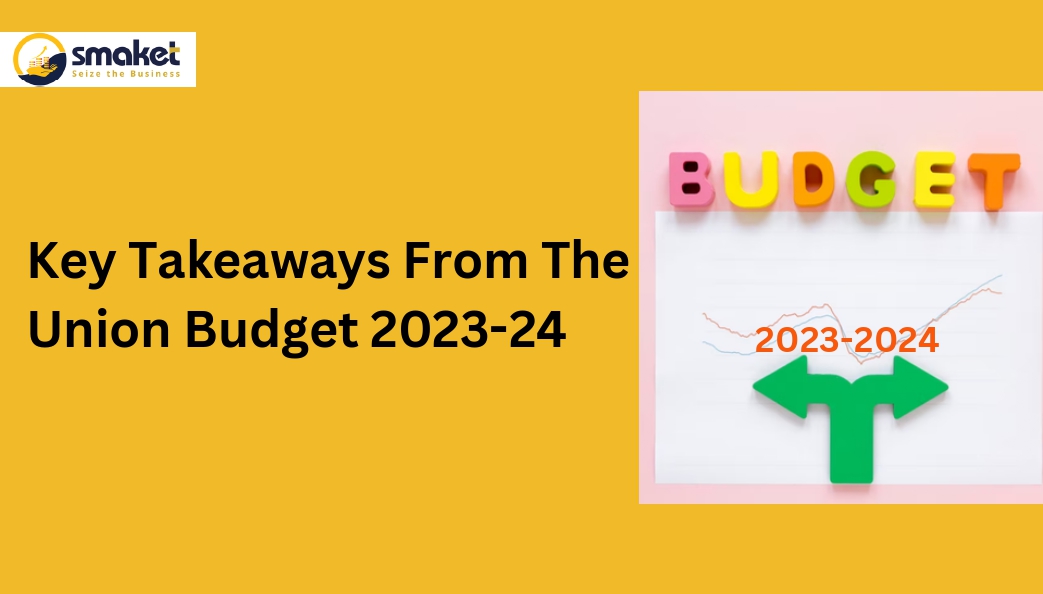The Union Budget 2023-24, provided through Finance Minister Nirmala Sitharaman, lays out a transformative roadmap for monetary growth and improvement. Emphasizing the standards of "Amrit Kaal," the budget makes a speciality of inclusive development, infrastructure, inexperienced increase, and financial area balance. This article delves into the key highlights of the finances, consisting of measures to provide remedy for MSMEs and taxpayers, tax reforms, and initiatives for skilling and sustainable development.
Relief for MSMEs:
The budget brings forth sizeable measures to provide comfort to Micro, Small, and Medium Enterprises (MSMEs). These measures consist of:
Revamped Credit Guarantee Scheme:
Effective from April 1, 2023, with an input of Rs nine,000 crore inside the corpus, enabling additional collateral-unfastened credit of Rs 2 lakh crore to MSMEs.
Enhanced Limits for MSMEs:
Improved limits for micro-companies and specialists, offering benefits of presumptive taxation and ninety five% non-cash receipts.
Vivad Se Vishwas I – Relief for MSMEs:
MSMEs failing to perform contracts throughout the Covid duration will get hold of ninety five% of the forfeited quantity from the authorities and authorities undertakings.
Vivad Se Vishwas II – Settling Contractual Disputes:
A voluntary agreement scheme brought for contractual conflicts of presidency and its undertakings, imparting graded settlement phrases.
Tax Benefits for MSMEs:
Small corporations with a turnover of as much as Rs 2 crore and sure specialists with a turnover of as much as Rs 50 lakh are eligible for elevated limits. A deduction for fees incurred on bills made to MSMEs will also be allowed. Digilocker- One-stop KYC Maintenance System: Simplified KYC system the use of Digilocker and Aadhaar as foundational identity, benefiting MSMEs, trusts, and other entities.
Tax Benefits for Startups:
Income tax benefits extended to startups until March 2024, with the benefit of carrying forward losses for 10 years.
The budget also introduces several measures to provide relief to individual taxpayers:
Increased Income Tax Threshold:
The income level to which no income tax is payable raised to Rs 7 lakh a year from 2023-24, applicable to taxpayers choosing the New Tax Regime.
Default Income Tax Regime:
The new tax regime becomes the default one, while individuals retain the option to opt for the old tax regime.
Reduced Surcharge Rate:
The highest surcharge rate under the new tax regime lowered from 37% to 25%.
Revised Tax Slabs:
New tax slabs introduced under the new tax regime, offering different tax rates based on income levels.
Faster ITR Processing:
Income tax return processing period reduced by 16 days, and new ITR forms introduced for faster and easier filing. Infrastructure Development and Sustainable Measures The budget aims to foster infrastructure development and sustainability:
Capital Expenditure Boost:
Capital expenditure to be raised by 33% to ₹10 lakh crore, accounting for 3.3% of the GDP, to bolster infrastructure development.
Green Credit Program:
Introduced under the Environment (Protection) Act to incentivize environmentally sustainable measures by companies, individuals, and local bodies.
Skill India Digital Platform:
A unified platform launched to facilitate demand-based formal skilling, linking with employers, including MSMEs, and enabling access to entrepreneurship schemes.
Mahila Samman Savings Certificate:
New women’s savings plan: 2-year deposit, Rs 2 lakh, 7.5% interest, partial withdrawal option.
Conclusion:
The Union Budget 2023-24 signifies a determined effort to drive robust economic growth, provide relief to MSMEs and taxpayers, and promote sustainable development. The comprehensive measures introduced in this budget are expected to pave the way for a more prosperous and resilient economy, benefiting citizens and businesses alike. As India embarks on its path of progress, these key takeaways from the budget will play a pivotal role in shaping the nation’s future.

